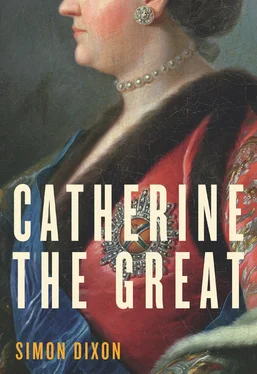Apart from the fact that Catherine liked a bargain, the most important benefit conferred by great works of art was international prestige. Like diplomacy, collecting was a competitive business. And paintings, no less than territory, were best acquired at the expense of weakened rivals. Gotzkowsky’s collection was snatched from under the nose of Frederick the Great when financial embarrassments brought about by the Seven Years’ War prevented him from fulfilling his promise to buy them for himself. Paradoxically, such triumphs made it harder for the empress’s agents to strike a confidential deal once her interest leaked out to journalists hungry for gossip on the Parisian art market. In 1768 Bachaumont’s Mémoires secret s mocked Diderot’s vain attempts to acquire Louis-Jean Gaignat’s paintings, which foundered on a will forbidding the sale of the collection as a whole. Forced to compete against the duc de Choiseul at auction in February 1769, he eventually acquired only five pictures, including Murillo’s Rest on the Flight to Egypt . Falconet told Catherine that it was a painting ‘to speak of on one’s knees’. As Diderot discovered, to represent an upstart foreign power that threatened to denude France of such treasures was to invite widespread obloquy. Some feared that the greatest Western masterpieces were disappearing into oblivion. ‘How sad it is to see going and passing into the hands of the Scythians things that are so precious that ten people at most will admire them in Russia,’ complained Jean-Henri Eberts in September 1769. ‘Everyone can aspire to the pleasure of seeing the banks of the Seine, but few are curious to visit those of the cold Neva.’ 47Diderot himself was more philosophical. Having initially doubted the empress’s ability to collect enough paintings to inspire good taste in art, he gradually acknowledged the changing balance of power. ‘We sell our pictures and our statues in the midst of peace, but Catherine buys them in the midst of war,’ he remarked in rueful admiration to Falconet in April 1772. ‘The sciences, the arts, taste and wisdom climb to the north, and barbarism with its train comes southwards.’ 48
Egged on by Grimm, Diderot’s Neapolitan friend, the economist abbé Galiani, later found a philosophical explanation for these developments in an ironic contrast between Catherine and the king of France. If one wanted to know why ‘the Russians have climbed so high and the French come tumbling down so low under Catherine and Louis XV’, then the causes were to be found ‘in the character, conduct and gestures of their sovereigns’. Both monarchs had encouraged luxury and the arts, and yet ‘French morals have been corrupted, valour has gone soft, while the opposite has happened to the Russians. The reason is that in France they have encouraged a voluptuous luxury which enervates, and in Russia a magnificent luxury which invigorates.’ ‘The cause of the decadence of French military power,’ Galiani concluded, ‘and the aggrandisement of that of the Russians derives from the same principle.’ The Russians would never have won their battles had they been covered ‘in lace and chiffon’. 49
* * *
Since war was even more expensive than art collecting, its onset led Catherine to tighten her tax policy. She could also draw on a new stream of income because the Russo-Turkish campaign of 1768–74 was the first to be financed by foreign loans, advanced by the Amsterdam finance markets on the strength of her armies’ performance in the Seven Years’ War. These loans in turn prompted unprecedented financial sophistication within Russia as the empress oversaw the introduction of paper money under the aegis of a new bank, created at the end of December 1768 and headed by Andrey Shuvalov. Whereas Peter III had contemplated five notes in 1762, ranging in value from 10 to 500 roubles, Catherine settled for four denominations: 25, 50, 75 and 100. Before long she faced problems of forgery and inflation. ‘I have in my hands a 100-rouble note numbered 80,000’, reported the hostile French ambassador in September 1770. ‘It is from last year: another indication that this operation is overstretched.’ By the end of the war, notes to the value of some 12.7 million roubles were in circulation. 50There were short-term worries too. While Count Solms, the Prussian ambassador, was anxious that Shuvalov’s very name would be sufficient to revive ‘disagreeable memories’ of his father—Elizabeth’s unpopular minister, Peter Shuvalov—who had ‘acquired millions at the expense of the state and to the ruin of several individuals’, Catherine was more concerned about the change of culture required in her own Court administration. 51As she complained to Yelagin in April 1769:
It is with the greatest possible surprise that I hear that the palace chancellery is refusing to accept state assignats from private individuals. A peasant presented his papers and was told to bring cash. Can it be that my statutes are not valid in the palace chancellery, or do the clerks steal [coins] for their own loathsome gain, when no accounting errors can be made with assignats? Kindly look into this without delay: I beg you to punish those who have infringed my statutes. 52
Such tones were always reserved for officials who should have known better. Even so, a degree of tetchiness was understandable as the empress became impatient with the protracted preparations for battle. Although war had been declared in the autumn, it was not until the following spring that campaigning could begin. While more than 50,000 troops were being recruited, Catherine spent the winter of 1768–9 reading herself into a world as far removed from Panin’s Northern System as it was possible to imagine. Since there was no prospect of drawing the Italian states into her conflict with the Turks—Naples, she discovered, danced ‘to the sound of the French flute, and this flute is not in harmony with the voice of Russia’—she concentrated on trying to support the Corsican revolt against France. Boswell’s account of his travels on the island, provided for her by Lord Cathcart, enhanced her admiration for the revolt’s leader, General Pasquale Paoli. 53Judging from the letter she wrote to Ivan Chernyshëv on 14 December, Paoli’s buccaneering spirit proved more infectious than the smallpox:
And now the sleeping cat has been awakened; and now the cat is going to chase the mice; and now you will see what you will see; and now they’re going to talk about us; and no one will expect all the racket we’re going to make; and now the Turks are going to be defeated; and now the French will everywhere be treated as the Corsicans treat them; and now that’s quite enough verbiage. Adieu, Monsieur! 54
Meanwhile, spontaneous revolts among the Balkan Slavs seemed to offer the prospect of coordinated resistance against the Turks, and especially in Montenegro, where an Italian bandit calling himself Stephen the Little had publicly declared that he was Peter III, giving Catherine an added incentive to intervene. She employed an Italian aristocrat in a vain attempt to draw the Order of the Knights of Malta into her struggle against the infidel. ‘Above all,’ as Franco Venturi has shown, ‘she created a net of agents and listening posts in Italy and thus set in motion a type of diplomacy quite different from the traditional one.’ 55
Most of this was as much the stuff of fantasy as the ancient prophecy, unexpectedly given renewed credence by Russian designs on Constantinople, that the downfall of the Ottoman Empire would be brought about by a race of blond men. 56Yet for Catherine the deeds of war were bound to remain a thing of the mind. Unlike the male monarchs of her age, who regularly led their troops into battle, she could experience war only vicariously. For much of the time, she was forced to play a waiting game, not without its stresses for a sovereign accustomed to rapid progress in all her activities. Both her mood and her health fluctuated sharply with the news from the front. Victories were greeted with unrestrained joy, reverses with undisguised irritation. During the anxious intervals in between, her entourage did their best to keep her relaxed and amused.
Читать дальше












